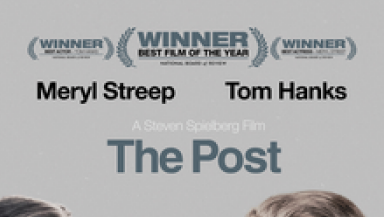Sometimes you have to delve into history to shine a light on the present. Steven Spielberg's latest film might be set at the very start of the 1970s, but the themes at the heart of The Post are located squarely in 2018. The story of The Washington Post's battle to reveal dark secrets about the US government and the Vietnam War is on one level a period piece about light being shed on that particular injustice, but it's also constantly got one eye on the age of fake news. It's no coincidence that a film about the freedom of the press has been released at the very moment that this freedom is at great threat of being eroded.

Meryl Streep and Tom Hanks play the newspaper's owner and editor respectively, uncovering the most volatile of stories just as the stock market flotation of the paper requires stability. If they run, they risk incurring the wrath of the Nixon administration, being held in contempt of court and even sinking the business deal that has been set up to save them. If they don't, they miss the chance to steal a march on their great rivals at The New York Times, and worse still become another part of the cover-up that has sent thousands of young Americans to die, apparently in a conflict that their country knew could not be won.
It's a sobering history lesson, and has an interesting dilemma at its heart: what are any of us prepared to risk in order to reveal – or hide – the truth? Like fellow Oscar Contender Darkest Hour, the film has a very Biblical theme at its heart, but while the former is proof of Saint John's words about light resisting the darkness, The Post resonates with Jesus' promise in John 8:32 that 'the truth shall set you free.' In context, Jesus is suggesting there that those who hold to his teaching – about pursuing compassion for each other, integrity and justice – will be set free in a world that seeks to restrict all of those things. In The Post, Streep, Hanks and their team of investigators are trying to fulfil exactly that responsibility against a government that will do anything to prevent both truth and freedom.
Elsewhere, Jesus also says that 'there is nothing hidden that will not be disclosed, and nothing concealed that will not be known or brought out into the open (Luke 8:17)', and it's the belief that the press has a role in enacting this that drives the newspaper's intrepid team of investigators onward. It's perhaps not even too much of a stretch to suggest that journalists of integrity, when applying scrutiny to corrupt politicians, are the very hands and feet of God.
The Post has been mooted as a potential Best Picture winner at next month's Oscars, but in the spirit of honesty that the film inspires, I have to confess a little disappointment with it. Streep and Hanks are excellent at the heart of the story, but both play the big performance versions of themselves that we've seen before; neither of them ever really excites or surprises the viewer. While Spielberg's direction is unfussy, there's little artistry compared to something like Three Billboards Outside Ebbing, Missouri. There are no truly standout scenes; no great, memorable speeches. Considering the extraordinary stakes involved, the film just never really ignites.
The one thing Spielberg does shoot beautifully, and with great affection, is the machinery of traditional newspaper printing. The huge old presses, sent irreversibly into action at the film's climax; the hot metal of pre-digital printing; even the glorious indelicacy of distribution and delivery – each not only light up the screen, but suggest something profound about the relative reliability of old media, and the importance of trust in the media. Watching in an age of fake news, the spectre of the digital revolution looms large, as if Spielberg is calling on us not to lose sight of the values that have made journalism such an important driving force in history.
Honestly though, the film is a tiny bit dull. Part of the problem, I think, is the relative proximity of Spotlight, a magnificent journalistic-integrity movie that's still fresh in the memory. That film is so good, so emotive, and somehow so much more gripping, that in direct comparison The Post just can't measure up. It's as if a beloved pet hamster has been sneakily replaced by well-meaning parents after death. The second one kind of looks the same, but it's not quite so intelligent, and it can't run as fast on the wheel. You spend your whole time thinking, you're great, but you're not Spotlight.
It's not a bad film by any means, and has more than one important message. Streep's character, Kay Graham is not only at the centre of a complex ethical dilemma, but is also presented with the chance to be a trailblazer in a male-dominated world. The subtle gender-based prejudice she's subjected to, even when apparently in control is another nod from past to present, and the vulnerable, stumbling path she takes toward personal growth is one of the film's best and most nuanced elements.
There's an utterly brilliant final last scene (cut and pasted from Hanks' Forrest Gump), a witty script, and plenty of good supporting performances. Ultimately though, the sum of those solid working parts only add up to a solid drama. It's a film with a vitally-important theme however, and one that urges us to learn the lessons of history, and perhaps of the Bible too.
Martin Saunders is a Contributing Editor for Christian Today and the Deputy CEO of Youthscape. Follow him on Twitter @martinsaunders.













